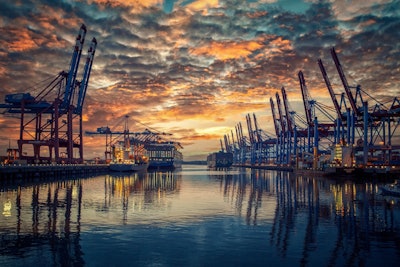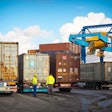
The amount of corn China has imported in 2021 grew exponentially when compared to years past, and Brett Stuart, CEO and co-founder of Global AgriTrends, indicated a similar amount of corn could be imported by Asia’s largest nation again in 2022.
Stuart analyzed China’s impact on the global agrifood industry while speaking during the webinar, 2022 & the Global Commodity Super Cycle, part of the Balchem Real Science Lecture Series. The webinar was held on December 15.
Citing U.S. Department of Agriculture data, Stuart noted that China imported about 26 million metric tons of corn in 2021, yet before 2020 it seldom imported much more than 5 million metric tons in a year.
这正值中国声称have completed a record corn harvest in the fall. Stuart said we should be skeptical.
When looking at the average prices of corn in some of the world’s largest corn producing and consuming countries, he said the price has gone down “fairly significantly” in both the United States and Brazil, yet Chinese corn prices are still around $11 per bushel, he noted.
The fact that the price doesn’t appear to be going down makes Stuart think the harvest may not have been as successful the claims suggested.
“Now they claim they harvested a record crop this fall, but they’re still importing and their prices aren’t going down, and they’ve liquidated a bunch of hogs over the last six months,” said Stuart.
“So even with fewer hogs and a supposed record crop, they are aggressively buying in the international markets and their corn prices aren’t going down, I would question whether China has as much corn as they say they have.”
Stuart advised to not be too surprised if China imported similar amounts of corn in the coming year, and if it does, it “will have a major impact on the global corn markets.”
Imports of other commodities
Stuart anticipates that China will be the world’s largest importer of soybeans in 2022. That should not be surprising to anyone, considering that it has consistently been the largest soybean importer over the past few decades.
But wheat is another story.
At the present time, China is the world’s third largest wheat importer, although earlier in 2021 it was the second largest importer, trailing only Egypt. Presently, Indonesia, which has been the world’s second largest importer of wheat for the majority of the past five years, has regained its No. 2 position with China and Turkey closely behind.
With annual imports of about 10 million metric tons, that is a huge increase from years past, when it was estimated at about 3 million metric tons.
Impact of Phase 1 trade agreement
Stuart also pointed out that China has also been the world’s largest importer of pork and beef, as well as the world’s second largest importer of chicken.
He estimated that China imported about $33 billion worth of U.S. agriculture products in 2021. Some of that can be attributed to the Phase 1 trade agreement implemented during the Donald Trump presidency, but Stuart says there are other factors that could be more significant.
“China is going to continue to drive all of our commodity markets. We can look back at the Phase 1 deal that President Trump negotiated and the big purchase commitments,” he said, noting that China committed to purchasing $37 billion dollars of goods per year.
“Well, they haven’t reached that, but when you look at what they’ve done, it’s pretty incredible. The Phase 1 deal was more than just purchase commitments. It opened the market for beef. It took down some of the sanitary/phytosanitary barriers that we fought with China, so it really opened the market. But China isn’t buying $5 billion in October because of Trump’s purchase commitment. They’re buying it because they need it. So the Phase 1 agreement gave a little bit of a boost, but there isn’t a gun to China’s head saying you have to keep buying more and more U.S. agriculture (goods). There’s no real accountability even for that agreement, especially with a new administration.”














![Logan And Jerry Fitch[1]](https://img.feedandgrain.com/files/base/wattglobalmedia/all/image/2023/05/Logan_and_Jerry_Fitch_1_.6470faf6bcc37.png?auto=format%2Ccompress&fit=crop&h=112&q=70&w=112)



